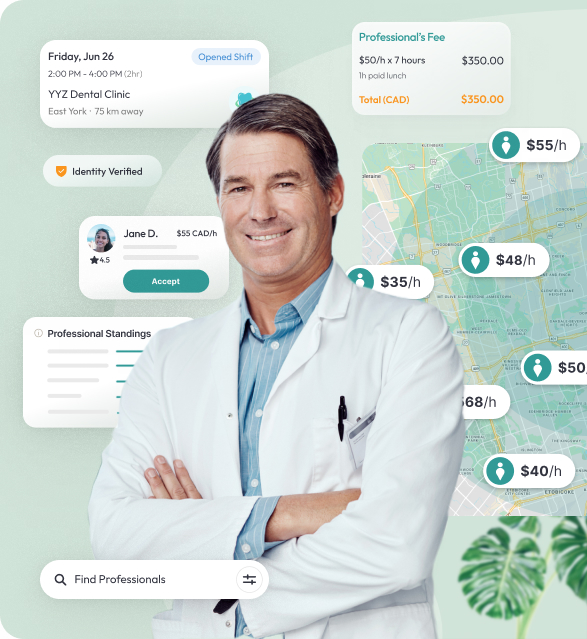Discover the Path How to Become a Dental Hygienist
Dental Hygienist — Career Outlook and Opportunities
Dental hygienists are highly sought-after and well-compensated professionals in Canada’s healthcare field. They perform essential tasks related to oral care, including:
- Cleaning teeth to remove plaque and tartar;
- Educating patients about proper oral hygiene;
- Conducting screenings for gum diseases and other oral health issues;
- Applying fluoride and other preventive measures to combat cavities;
- Taking dental X-rays and other diagnostic images;
- Collaborating with dentists and other specialists in oral care.
Employment Settings for Dental Hygienists
Dental hygienists have the flexibility to work either full-time or part-time, catering to their preferences and employers’ requirements. They also have the option to explore various forms of employment, such as:
- Permanent or temporary positions;
- Contractual or independent work;
- Employment at multiple workplaces.
Working as a dental hygienist comes with the advantage of job flexibility and diversity, while also enjoying a respectable salary. Data from the Indeed website indicates that the average annual salary for dental hygienists in Canada is approximately $96,000.
Growth and Demand in the Dental Hygiene Field

Before delving into how to become a dental hygienist in Canada, it is crucial to grasp the profession’s growth prospects and demand. Dental hygiene is a rapidly growing field in Canada, with Statistics Canada forecasting a 27% surge in job opportunities for dental hygienists from 2019 to 2029. Several factors contribute to this growth:
- Population growth and increased life expectancy;
- Heightened awareness of oral health importance;
- Expanded access to high-quality dental services.
- Advancements in dental technology and innovations.
Specializations and Advanced Career Paths
Dental hygienists have the opportunity to specialize in various areas of dentistry, such as:
- Orthodontics;
- Periodontology;
- Pediatric dentistry;
- Implantology;
- Dental sleep medicine.
Furthermore, dental hygienists can progress in their careers and assume more responsible and leadership roles, such as:
- Manager or coordinator of the dental hygiene department;
- Instructor or mentor for students or novice dental hygienists;
- Consultant or auditor for the quality and safety of dental services;
- Researcher or developer of new methods and products for oral care.
6 Steps How to Become a Dental Hygienist
To become a dental hygienist, you can follow these steps:
Obtain Dental Education
To begin the journey of becoming a dental hygienist, you need to acquire a diploma or degree in dental hygiene. This typically entails completing a two to four-year education program at an accredited institution offering dental hygiene programs. Here is a list of some colleges and universities in Canada that offer Registered Dental Hygienist courses and diplomas:
- St. Clair College;
- Dalhousie University;
- University Of Manitoba;
- University of Alberta;
- Toronto College Of Dental Hygiene & Auxiliaries;
- Vancouver Island University.
Completing Licensing Requirements
To meet the dental hygienist requirements in Canada, you must obtain a license from the relevant regulatory body in the province or territory where you intend to practice. Obtaining the license involves fulfilling the following criteria:
- Successfully pass the national examination in dental hygiene administered by the National Dental Hygiene Certification Board (NDHCB).
- Successfully pass the jurisprudence examination, which assesses your knowledge of dental legislation and ethics specific to your province or territory.
- Provide evidence of your education, work experience, and good standing.
- Pay the necessary fees and adhere to the code of professional conduct.
Continuing Education and Specializations
To stay current in the field of dental hygiene, it is essential to continually update your knowledge and skills.

This may involve:
- Attending seminars, conferences, webinars, and other events related to dental hygiene.
- Reading scientific articles, journals, books, and other sources of information pertaining to dental hygiene.
- Engaging in professional associations, networks, or communities dedicated to dental hygiene.
Update your Resume
Creating a compelling resume is crucial. Here are some tips on how to become a dental hygienist in Canada:
- List your education, certifications, and continuing education in reverse chronological order.
- Detail your work experience in dental hygiene, including the organization name, position, period of employment, key responsibilities, and accomplishments, in reverse chronological order.
- List your dental hygiene skills and competencies, such as dental instruments, radiography, and patient communication.
Apply for a Job as DH at Tempfind App

One effective approach to discovering opportunities in this field and understanding how to become a dental hygienist is by using the Tempfind app, which specializes in providing temporary job placements for dental hygienists and other oral care professionals. Tempfind app also provides several benefits of a dental hygienist, including:
- Obtaining experience in diverse dental settings and with a wide range of patients;
- Acquiring knowledge about new technologies and advancements in dentistry;
- Enhancing your skills and competencies in dental hygiene;
- Earning extra income or pursuing full-time employment.
Building a Successful Dental Hygienist Career
By leveraging both temporary and permanent dental hygienist job opportunities, you can continuously improve your skills and competencies in the dental hygiene field and explore new paths for career advancement and personal development.
Skills Required for Dental Hygienist
Becoming a dental hygienist requires possessing certain skills and competencies that enable you to perform tasks with high quality and efficiency.

Some of these skills and competencies include:
Dental Instrumentation and Techniques
As a dental hygienist, you must be adept at using a variety of dental instruments and techniques to perform oral hygiene procedures effectively:
- Scalers, curettes, polishing brushes, and pastes for removing plaque and tartar from teeth.
- Fluoride gels, varnishes, and foams for preventing cavities.
- Anesthetics, antibiotics, and anti-inflammatory agents for treating gum diseases and other oral issues.
- Mirrors, probes, tweezers, and other instruments for conducting oral examinations.
Radiography and Imaging Proficiency
To learn how to be a dental hygienist, it is crucial to become proficient in taking various diagnostic images of the oral cavity. This includes:
- Bitewing X-rays for detecting caries between teeth;
- Periapical X-rays for studying tooth roots and bone tissue;
- Panoramic X-rays for obtaining an overall view of the jaws and teeth;
- Cone-beam computed tomography (CBCT) for three-dimensional modeling of the oral cavity.
Effective Communication with Patients
As a dental hygienist, you should possess the skill to communicate effectively with patients at different stages of dental care, which includes:
- Gathering medical history, complaints, and patient expectations;
- Explaining the goals, procedures, and outcomes of dental care;
- Educating patients on proper oral hygiene practices;
- Addressing patients’ questions, doubts, or concerns.
- Maintaining a friendly and courteous atmosphere.
Empathy and Compassion in Patient Care
You must be able to demonstrate empathy and compassion towards patients who seek dental care from you.

Empathy and compassion entail:
- Understanding and sharing patients’ feelings, thoughts, and experiences;
- Respecting and valuing the uniqueness and dignity of each patient;
- Endeavoring to alleviate suffering and enhance the quality of patients’ lives;
- Supporting and motivating patients in achieving their oral health goals.
Collaboration with Dental Team
Collaborating with a team of dentists means that you:
- Share information, knowledge, and experiences with colleagues;
- Consult and coordinate with colleagues on matters of diagnosis, treatment, and prevention;
- Follow the guidance and instructions of dentists or other senior specialists;
- Respect and acknowledge the role and responsibilities of each team member;
- Resolve conflicts and issues within the team constructively and diplomatically.
Critical Thinking and Problem-Solving Skills
This entails:
- Analyzing and evaluating information, data, and evidence from various sources;
- Formulating hypotheses, objectives, and action plans to address issues;
- Applying logic, creativity, and innovation to problem-solving;
- Verifying the reliability, effectiveness, and consequences of results, conclusions, and solutions;
- Reflecting on your experiences, learning from mistakes, and adjusting your decisions.
Frequently Asked Questions
Are there opportunities for advanced degrees in dental hygiene?
Indeed, there are educational institutions that offer dental hygiene programs. You can find a list of these institutions on the Canadian Dental Hygienists Association (CDHA) website.
What skills are important for a dental hygienist?
A dental hygienist must possess various skills and competencies to perform their tasks with high quality and efficiency:
- Dental instruments and techniques;
- Radiography and visualization;
- Effective communication with patients;
- Empathy and compassion in patient care;
- Collaboration with a team of dentists;
- Critical thinking and problem-solving skills.
How can I improve my manual dexterity for dental tasks?
To improve your manual dexterity, you can:
- Regularly perform exercises to develop hand strength, flexibility, and coordination;
- Practice using various dental instruments under the guidance of experienced dental hygienists or dentists;
- Study the anatomy and physiology of the oral cavity and the maxillofacial area to understand how to work with different structures and tissues.
How does communication play a role in dental hygiene?
Communication plays a crucial role in dental hygiene as it allows you to:
- Build trusting and friendly relationships with patients;
- Explain the goals, procedures, and outcomes of dental care;
- Educate patients on proper oral hygiene practices.
What are the typical tasks performed by dental hygienists?
Dental hygienists perform various tasks related to oral care, such as:
- Cleaning teeth to remove plaque and tartar;
- Educating patients on proper oral hygiene practices;
- Conducting screenings for gum diseases and other issues;
- Applying fluoride and other preventive measures for cavity prevention;
- Taking X-rays and other diagnostic images.




